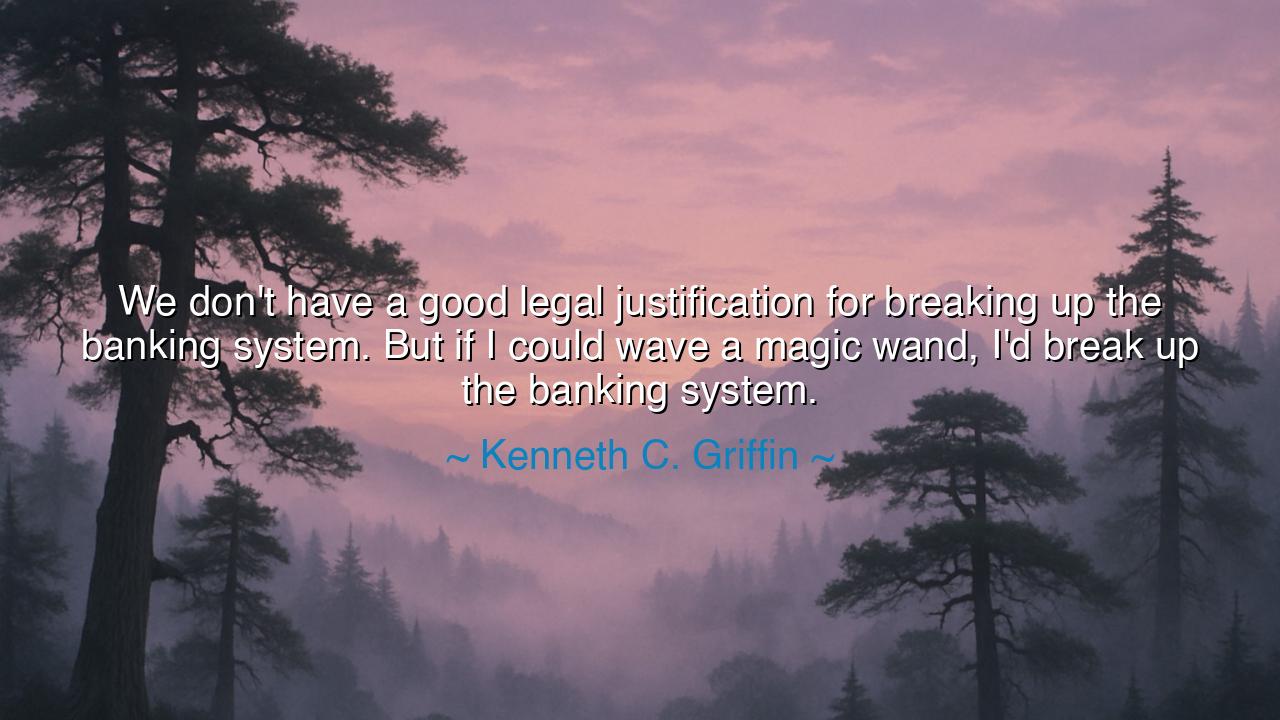
We don't have a good legal justification for breaking up the
We don't have a good legal justification for breaking up the banking system. But if I could wave a magic wand, I'd break up the banking system.






Hearken, O seekers of wisdom, to the words of Kenneth C. Griffin, who gazed upon the vast and intricate edifice of finance and declared: "We don't have a good legal justification for breaking up the banking system. But if I could wave a magic wand, I'd break up the banking system." In these words lies a meditation on power, risk, and human desire for balance; a recognition that even the strongest institutions, when left unchecked, can become leviathans threatening the stability of the society they serve.
Since the dawn of civilization, humans have created systems of exchange and credit, from the clay tablets of Mesopotamia to the coinage of Rome, and eventually to the modern banking system. These structures were designed to facilitate commerce, reward prudence, and provide security. Yet, as Griffin observes, the very concentration of power within these systems can create fragility, moral hazard, and disproportionate influence over the fate of the many. His yearning for a magic wand reflects an ancient wisdom: that the larger the instrument, the greater the risk it poses when it falters.
Consider the tale of the Great Depression in the early twentieth century, when unchecked speculation and consolidation within financial institutions led to catastrophic collapse. Banks, once viewed as guardians of prosperity, became agents of despair. The response of Franklin D. Roosevelt’s administration—breaking up major institutions and creating safeguards like the Glass-Steagall Act—demonstrates the necessity of structural limits. Griffin’s reflection echoes this historical lesson: concentrated power, even when lawful, can imperil the commonwealth if not restrained by prudence or design.
Yet Griffin also acknowledges the constraints of reality: a good legal justification is lacking. This tension is as old as governance itself. In Athens, ambitious reforms were often hindered by existing law; in Rome, even the wisest senators could not contravene established statutes without peril. Griffin’s words reveal the perennial struggle between ideal and actionable reform: the desire for correction, restrained by the boundaries of law, mirrors the tension between wisdom and power across the ages.
The essence of his statement lies not only in critique but in vision. To break up the banking system is to seek resilience, to diffuse risk, and to prevent the accumulation of influence that can subvert justice and fairness. In the modern era, institutions grow vast and interconnected, so that their collapse affects millions. Griffin’s imagined act of governance is a symbolic call to reimagine systems in ways that safeguard society, balancing ambition with caution, and strength with accountability.
From this reflection emerges a timeless lesson: power, when concentrated, carries responsibility and peril. Societies must recognize when institutions, however lawful or efficient, become too large to serve the common good without hazard. Griffin’s words encourage vigilance and imagination, a recognition that reform may be constrained by legal justification, yet necessary in spirit to protect the many from the failure of the few.
O seekers of wisdom, let this teaching guide your own judgment. Whether in business, governance, or personal endeavor, understand that concentration of power demands oversight, humility, and moral responsibility. The lesson of Griffin and of history is clear: law alone does not guarantee stability; structural wisdom and ethical foresight are required to prevent calamity and preserve the commonwealth.
Take this teaching into daily life: observe the structures around you, identify where power is concentrated, and advocate for balance, accountability, and prudence. Recognize that lawful authority is not infallible, and that the courage to imagine reform—like Griffin’s magic wand—is essential to safeguard the well-being of all. In this lies the enduring wisdom of the ancients: to temper strength with foresight, and to wield power, both personal and institutional, with prudence and care.






AAdministratorAdministrator
Welcome, honored guests. Please leave a comment, we will respond soon